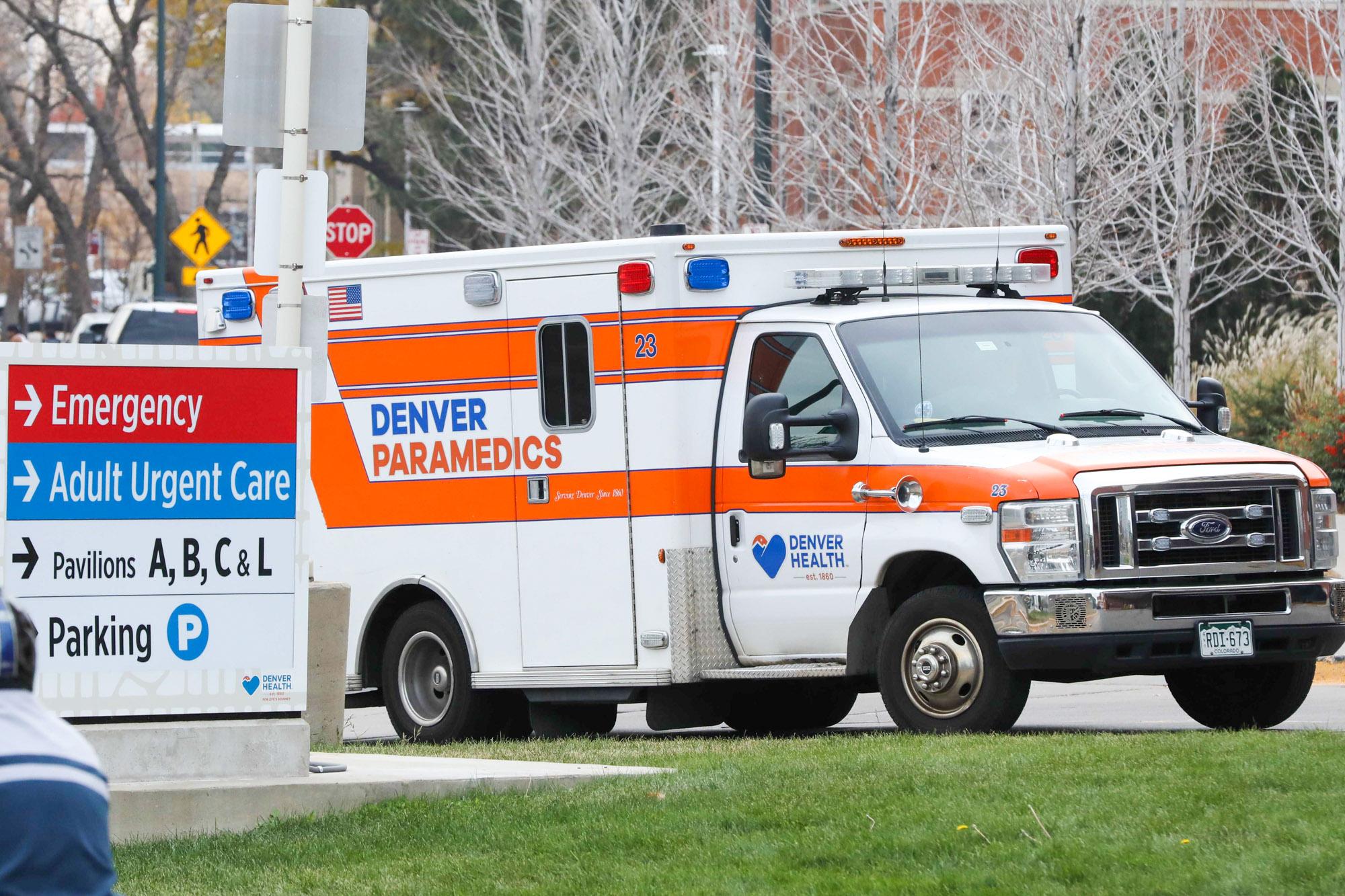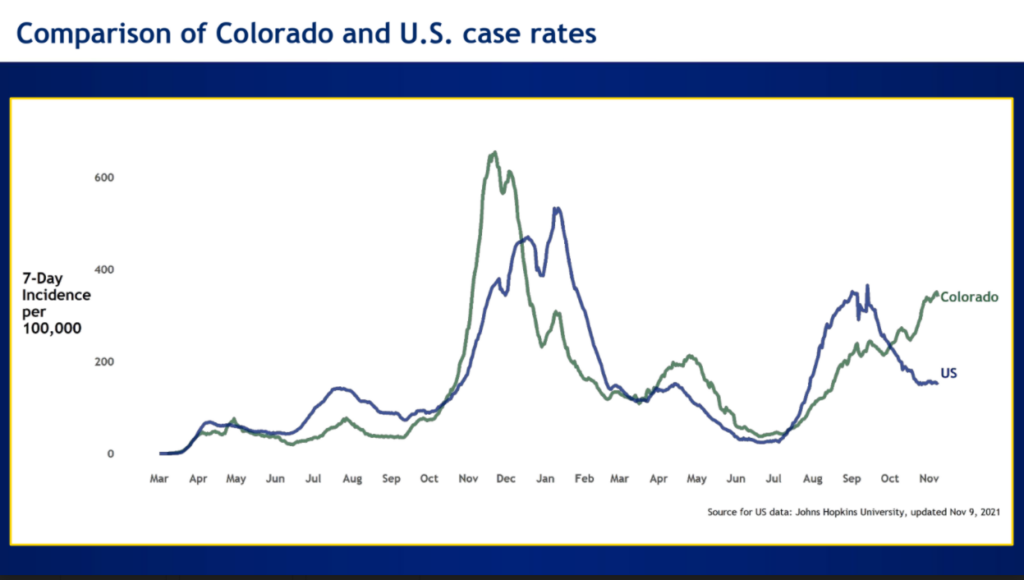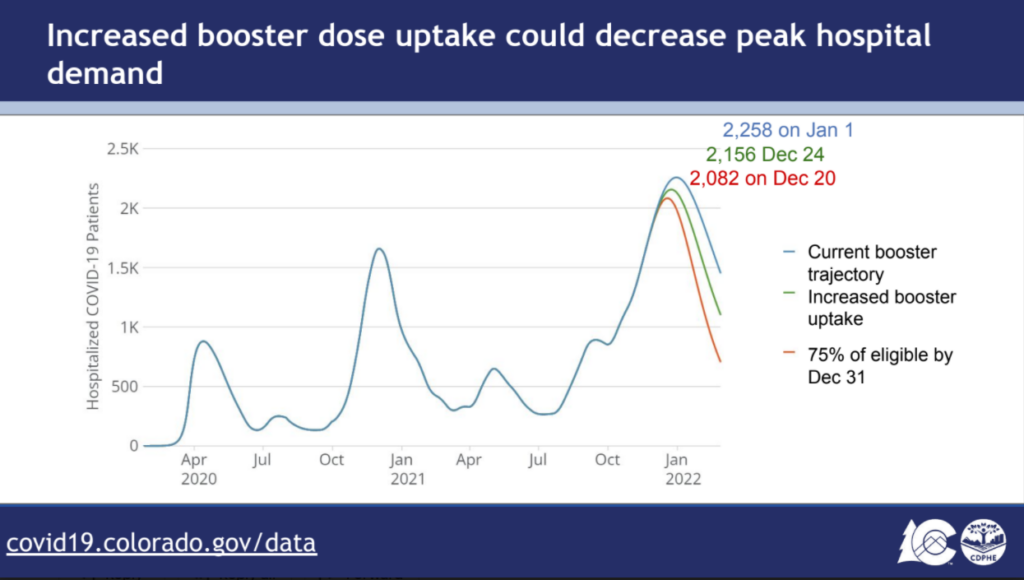
The state's epidemiologist warns the pandemic is likely to worsen in Colorado in the coming weeks.
“COVID-19 hospital demand will increase until late December and could potentially exceed our current hospital capacity,” Dr. Rachel Herlihy told a meeting of the Governor's Expert Emergency Epidemic Response Committee on Wednesday.
The group is advising the governor on potential responses, as the state scrambles to deal with the crisis that’s been building for months.
“The pandemic is not over with 1,400 people hospitalized, especially with these new projections,” said Gov. Jared Polis, who also joined the remote meeting.
That number is about 400 shy of the peak in Colorado a year ago but is still much higher than other times during the pandemic.
Polis outlined to members of the group, which includes leaders from various parts of the health system, steps the state is now taking to get ready and try to reduce transmission and drive down hospitalizations. The latest measures do not include a statewide mask mandate, which some doctors and public health experts say could be a significant step to help limit transmission.
The governor said he’s looking to expand the state’s hospital bed capacity and use state power to ramp up the distribution of COVID-19 vaccine boosters. He also wants cities and venues to require people attending large indoor events to be vaccinated.
On Tuesday, the state activated a key measure to help expand hospital staffing.
Polis laid out steps the state has already taken — which include temporarily stopping cosmetic surgeries and an executive order on patient transfers — and others that are in the pipeline to request FEMA medical surge teams, reactivate at least some of the state’s crisis standards of care protocols and scale up distribution of monoclonal treatments.
But he said, “It's not going to be enough.”
Polis's next steps include expanding hospital capacity and venues enforcing their own vaccine requirements.
Polis said one of the key next steps to alleviate hospitals in anticipation of the coming peak will be to expand hospital capacity, targeting 500 new beds.
“Now it's not going to be the same as when we built thousands of beds and they were standalone facilities,” Polis said, referring to makeshift overflow facilities constructed in 2020 at a few locations including the Colorado Convention Center, which did not end up being used.
Instead, he said this time, the idea is to generally work with providers to, “activate floors that have been closed to repurpose other areas. It's both the staffing and the space. This has already begun.”
Polis added that 20 new beds will be staffed by FEMA at Parkview Medical Center in Pueblo.
“We want to make sure that every Coloradan gets care,” he said.
Polis is looking to private venues and local communities to tighten restrictions on indoor gatherings. Last month, Kroenke Sports & Entertainment announced that fans attending games at Ball Arena or concerts at either that facility or Denver’s Paramount Theatre would soon need to provide proof of COVID-19 vaccination, or proof of a negative test taken within three days of their event.
That policy takes effect Wednesday night.
“We need to make indoor events safer. We can't afford super spreader events,” Polis told his advisors, though he did not call for statewide vaccine mandates.
The state will continue to promote booster doses of the COVID vaccine, even as some experts disagree on their necessity.
In his presentation before the GEEERC, Polis stressed the state needed a concerted push to get more booster doses out to Coloradans. He said it's been “frustrating” to him and members of his team, because they feel the federal agencies managing vaccines, the CDC and FDA, “bungled the messaging on the booster,” which he called “convoluted.”
Polis said the basic message should be, “You should get it.”
He said it was already the state’s “sort of unofficial” policy of “not turning anybody down” who attests they should get it, despite guidelines put out by federal regulators to limit boosters to those older than 65 or considered at high risk.
Polis said to make it official he would issue an executive order that says, “Colorado is a high-risk institution and everyone is eligible in Colorado on the argument that you are part of a high-risk environment by nature of being in Colorado.”
He said that move made sense as both a “legal framework” and “communication strategy.”
The step should increase the state’s vaccination rate as well and help decrease the spread of the virus in Colorado, the governor predicted.
Tens of millions of Americans became eligible for COVID-19 booster shots after endorsements last month by scientific panels, which advise federal agencies. But there was disagreement among experts about the need for booster shots in the US. among people not considered at high risk.
Some told the NYTimes that data show that except for adults over age 65, most Americans are already well protected against severe illness and do not need booster shots.
The state of the pandemic in Colorado now is a dire picture.
The CDC had not yet responded to CPR News’ request for comment by the time this story was published.
Herlihy's presentation to the governor’s advisory group painted as dire a picture as Colorado has seen in a year.
Colorado’s case rates shot up above the nation’s in October and are now well above where the U.S. stands. The state has a 7-day incidence rate of 361 per 100,000 people, which puts it at seventh-worst, behind a list that includes other western states like Alaska, North Dakota, Montana, Wyoming and New Mexico, along with Minnesota.

Herlihy said incidence rates are particularly high in western and southern Colorado and counties like Mesa and Pueblo.
Driving the trends, she said, are the spreadable delta variant, now 100 percent of all cases, and vaccination rates she says are still not high enough. She said vaccinated people are 8.9 times less likely to be hospitalized than the unvaccinated, and 79 percent of those currently hospitalized with COVID-19 are unvaccinated.
Higher levels of vaccination and increased uptake of booster shots would help, Herlihy said.
But she showed a slide from modeling projections that predicted Colorado could peak at 2,258 people hospitalized with COVID-19 on Jan. 1, 2022, even accounting for the state’s current booster capacity.

That peak would eclipse the 1,847 patients with confirmed coronavirus cases last December, and exceed the current hospital capacity, which is around 2000 beds.
“So when looking at strategies to try and preserve our hospital capacity, booster doses emerged as a really important strategy,” she said, to decrease the overall demand on our healthcare system and help to avoid “exceeding our hospital capacity.”
- Nov. 8: With Colorado hospitals full and short-staffed, some health care providers may need to work in roles they aren’t certified for
- Nov. 3: With Colorado hospitals overwhelmed, patients can now be transferred anywhere in the state
- Nov. 1: New Colorado health order allows hospitals to refuse patients as COVID cases and hospitalizations rise
- Oct. 25: Colorado COVID-19 hospitalizations keep rising, with unvaccinated patients filling ICUs and acute care wards
- Oct. 22: ‘No place for the patient to go ’ — As a new COVID wave hits, hospitals struggle to find open beds
- Oct. 12: Hospitalizations and deaths climb as Colorado’s fifth COVID wave keeps rising







